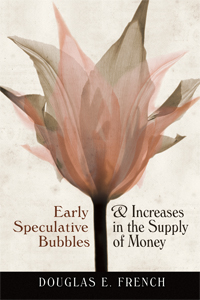The Trouble With Warren Buffett
by Doug French by Doug French
When a junior high investment club wrote in to CNBC’s Squawk Box to ask legendary investor Warren Buffett what he thought the price of gold would be in five years and whether the yellow metal should be a part of value investing, the Oracle of Omaha responded with:
"I have no views as to where it will be, but the one thing I can tell you is it won’t do anything between now and then except look at you. Whereas, you know, Coca-Cola will be making money, and I think Wells Fargo will be making a lot of money and there will be a lot — and it’s a lot — it’s a lot better to have a goose that keeps laying eggs than a goose that just sits there and eats insurance and storage and a few things like that. The idea of digging something up out of the ground, you know, in South Africa or someplace and then transporting it to the United States and putting into the ground, you know, in the Federal Reserve of New York, does not strike me as a terrific asset."
Obviously the junior high kids have been educated that inflation is coming down the pike given the massive monetary stimulus that the Federal Reserve is engineering. So it’s perfectly reasonable that they would pose their question to the world’s greatest investor. But Buffett doesn’t understand that gold is the people’s money. The yellow metal has been the free market’s currency for centuries. As Murray Rothbard explained, the necessary qualities for money are: generally marketable (non-monetary value), divisible, high value per unit weight, fairly stable value, durable, recognizable and homogenous. Gold satisfies all of these criteria. Shares of Coca-Cola and Wells Fargo don’t even come close.
The famous currency crank John Law held the same view as Buffett in the early 1700’s. In Law’s view the shares of the East India Company were better money than silver because the shares would rise in value along with inflation, as opposed to silver specie that would decline in value as more was discovered and produced. In Law’s mistaken view the capital of the East India Company was employed in productive activities, which would provide inflation protection. Law wanted his monetary system to be tied to productive assets, just as Buffett believes the productive assets of a soft drink maker and a bank will provide better protection than precious and scarce metals.
 Law was given a chance to test his theory in 1716 when one of Law’s partying friends, the Duke of Orléans, assumed control of the French government after Louis XIV died. Law’s Royal Bank created vast amounts of paper currency, and his Mississippi Company share prices took off which led Law to issue more shares, using the capital to refinance more of the government’s debt. Ultimately, the scheme unraveled and the French people sold their shares and sought the safety of gold and silver, leading Law to outlaw precious metal possession except by goldsmiths and jewelers, effectively demonetizing the metals so that only Royal banknotes and Mississippi Company shares would circulate as money. An outraged French public ultimately forced the Regent to place the once revered Law under house arrest.
Law was given a chance to test his theory in 1716 when one of Law’s partying friends, the Duke of Orléans, assumed control of the French government after Louis XIV died. Law’s Royal Bank created vast amounts of paper currency, and his Mississippi Company share prices took off which led Law to issue more shares, using the capital to refinance more of the government’s debt. Ultimately, the scheme unraveled and the French people sold their shares and sought the safety of gold and silver, leading Law to outlaw precious metal possession except by goldsmiths and jewelers, effectively demonetizing the metals so that only Royal banknotes and Mississippi Company shares would circulate as money. An outraged French public ultimately forced the Regent to place the once revered Law under house arrest.
Early during the same CNBC program a viewer asked Buffett if he believed what his father Congressman Howard Buffett believed, which was: "So far as I can discover, paper money systems [like John Law’s] have always wound up with collapse and economic chaos."
 "Sounds like my dad, yeah," Buffett replied, "I heard that every night at the dinner table for a long time." The Oracle admits that the printing of paper money is inflationary, but being a consistent proponent of expanding government, he constantly dismisses gold and proposals to return America to a gold standard.
"Sounds like my dad, yeah," Buffett replied, "I heard that every night at the dinner table for a long time." The Oracle admits that the printing of paper money is inflationary, but being a consistent proponent of expanding government, he constantly dismisses gold and proposals to return America to a gold standard.
His father Howard understood the evils of unchecked government money printing. "The paper money disease has been a pleasant habit thus far and will not be dropped voluntarily any more than a dope user will without a struggle give up narcotics," Congressman Buffett wrote. "But in each case the end of the road is not a desirable prospect."
The Congressman’s son may have heard his father at the dinner table, but he wasn’t listening. When asked if everything will turn out alright, Buffett said, "I think your kids will live better than mine, your grand children will live better than your kids. There’s no question about that."
No question?
"But we can be approaching the critical stage," the elder Buffett wrote back in 1948. "When that day arrives, our political rulers will probably find that foreign war and ruthless regimentation is the cunning alternative to domestic strife. That was the way out for the paper-money economy of Hitler and others."
The current monetary inflation will end as badly as Law’s, and shares of Coca-Cola and Wells Fargo will be no place to hide. Kids, start hiding some gold — carefully.




